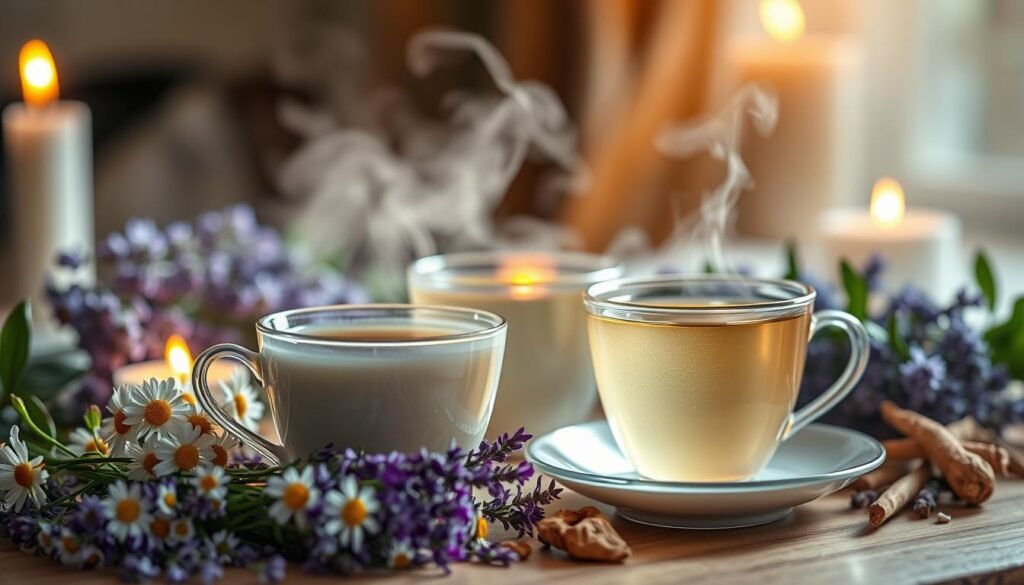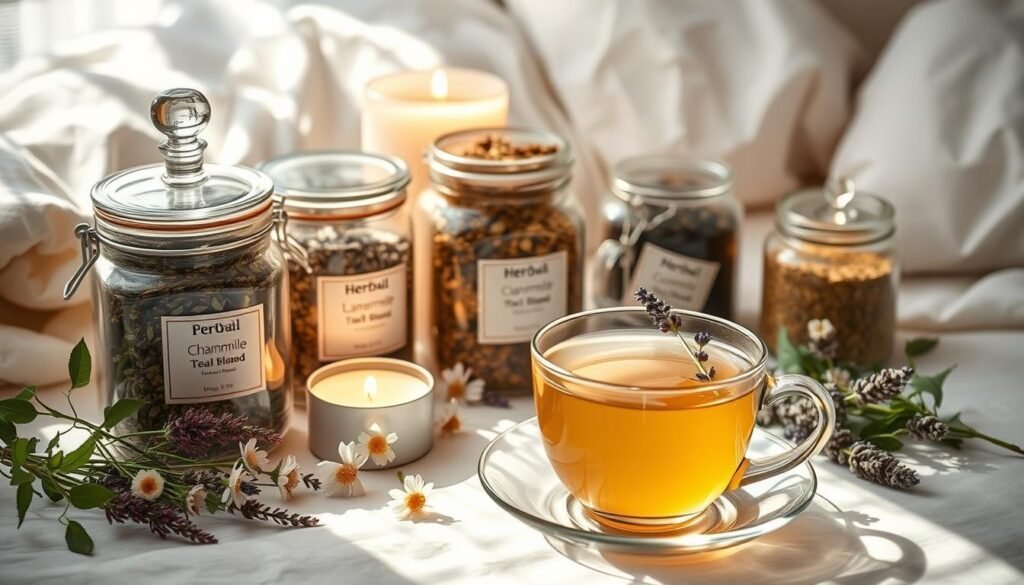Did you know a study in 2016 discovered that women drinking chamomile tea felt much less tired and depressed after childbirth? This shows how herbal teas are powerful, natural ways to sleep better. They help fight insomnia and improve sleep in today’s busy life.
Such teas have calming effects, making it easier to rest at night. Beth Czerwony, a dietitian, says these old remedies are great for getting ready to sleep. They help the body relax and prepare for a good night’s sleep.
Key Takeaways
- Herbal teas like chamomile, lavender, and valerian root can significantly enhance sleep quality.
- Studies show that herbal teas can help reduce symptoms of anxiety and promote relaxation.
- Regular consumption of herbal teas can aid in establishing a calming bedtime routine.
- Interactions with neurotransmitters in the brain contribute to the sedative effects of herbal teas.
- While herbal teas are beneficial, it’s essential to consider timing and potential side effects.
- Persistent sleep issues might require professional medical advice, even with herbal tea use.
- Minimizing fluid intake before bedtime can help prevent nighttime disruptions.
Understanding Sleep and Its Importance
Sleep is key for our health and happiness. It greatly impacts how we think, feel, and heal. Knowing about sleep cycles, including REM and non-REM stages, helps us understand its restorative power.
Not getting enough sleep can lead to big problems. These include feeling less alert, more stressed, and making poor decisions. Good sleep habits are essential. They help improve our sleep health. For example, avoiding coffee many hours before bed can make a huge difference.
Herbal teas can also help us sleep better. Chamomile tea is calming thanks to apigenin, a natural compound. Drinking certain teas regularly can lead to better sleep, according to research. Studies suggest benefits from having herbal tea two or three times a day for four weeks. This shows the value of natural solutions for sleep problems.
The Science Behind Sleep Disorders
Sleep disorders like insomnia greatly affect how we function daily. Causes of insomnia include stress, anxiety, and lifestyle habits. These problems can mess with our sleep cycles and mental health. Knowing how biological factors play a role is key to finding solutions.

Research shows a strong link between sleep quality and mental health. Sleep problems can make mental health issues worse, leading to more stress. Improving sleep can help ease mental health strains, making life better.
Studies point to natural remedies, such as chamomile and valerian root, as helpful. They may improve sleep and tackle insomnia’s root causes. For those facing sleep quality issues, combining these with standard treatments might offer relief.
Herbal Teas and Their Effects on Sleep
Herbal teas are known for helping improve sleep quality. They work through ingredients that help relax the body. Ingredients like chamomile’s apigenin and magnolia bark’s honokiol help with sleep. Drinking these teas can make you feel calm, which is great after a busy day.
How Herbal Teas Promote Relaxation
Today, many people feel stressed and it affects their sleep. Herbal teas offer a natural way to feel more relaxed. They help reduce anxiety and make it easier to sleep. People who drink them often say they feel less nervous.
This helps them sleep better. Turning stress into calm is key for good sleep.
Studies on Herbal Teas and Sleep Quality
Studies show that herbal teas really help with sleep. One important study found that these teas helped new moms sleep better. Herbal infusion studies confirm their benefits. So, herbal teas are effective, natural sleep aids.
Experiments show they help people with mild insomnia. They can sleep better without bad side effects. This shows herbal teas are good for treating sleep problems.

Top Herbal Teas for Better Sleep
Many herbal teas help improve sleep quality and reduce anxiety. Adding these teas to your bedtime routine can make a big difference. Here are some top picks.
Chamomile Tea: A Trusted Sleep Aid
Chamomile tea is well-known for its soothing effects. Studies show it can enhance sleep. For example, a study in 2017 found that nursing home residents slept better after taking chamomile extract daily. New mothers also enjoyed more restful sleep with chamomile tea. This is thanks to a compound in chamomile called apigenin.
Lavender Tea: Calming Benefits
Lavender tea is famous for its stress-reducing powers. A study in 2005 showed that lavender oil improved sleep length. Another study in 2012 found it helped women with insomnia. Lavender tea may also fight tiredness, as a 2015 study revealed.
Valerian Root Tea: A Natural Remedy
Valerian root tea is gaining popularity as a sleep aid. It may boost a brain chemical called GABA, aiding sleep. A 2011 study highlighted improved sleep quality in adults who drank this tea. It’s a favorite for those looking for better sleep.
Other Herbal Options: Passionflower and Magnolia
Don’t overlook passionflower tea. A 2011 study showed it improves sleep quality. Magnolia bark also helps with sleep and relaxation. Alongside the earlier options, these teas offer many benefits for deeper sleep.
Try chamomile, lavender, valerian root, and passionflower teas at night for better sleep. For more advice on easing anxiety and sleeping well, check out expert tips on natural remedies.
| Herbal Tea | Main Benefits | Notable Studies |
|---|---|---|
| Chamomile Tea | Calms the mind, improves sleep quality | 2017 study on nursing residents |
| Lavender Tea | Reduces anxiety, enhances sleep duration | 2005 study on sleep duration with lavender oil |
| Valerian Root Tea | Increases GABA, promotes restful sleep | 2011 study on improved sleep quality |
| Passionflower Tea | Improves sleep quality | 2011 study on subjective sleep improvement |
Benefits of Drinking Herbal Teas Before Bed
Drinking herbal teas before bed can help a lot with sleep. A huge number, about 70 million Americans, struggle with sleep problems. Herbal teas are key for relaxation and getting your body ready for bed.
Interactions with Neurotransmitters
Herbal teas affect important brain chemicals, easing anxiety and promoting calm. Chamomile tea, for instance, has apigenin. This helps you sleep better by reducing stress. Lavender tea works by decreasing stress, which calms your mind.
Passionflower tea is great for calming brain activity, making it easier to fall asleep.
Setting a Sleep-Inducing Routine
Drinking herbal teas 30 to 60 minutes before sleeping can improve your sleep. It makes you feel relaxed and comfortable. Having a regular bedtime routine with herbal teas makes falling asleep easier.

Potential Drawbacks of Herbal Teas for Sleep
Many people use herbal teas to help with sleep problems. However, it’s important to note some cons. Caffeine levels in herbal teas can vary a lot, which might affect how well we sleep. An average tea cup may have about 11–61 mg of caffeine. Studies show even 200 mg of caffeine consumed six hours before sleep can harm our rest.
For those who are sensitive to caffeine, certain teas can cause issues. These include anxiety, poor sleep, and headaches. Drinking caffeine through tea regularly might even lead to daily headaches. So, choosing the right herbal tea is key.
People on medication need to be extra careful about the herbal teas they drink. Some teas, like those with black cohosh or licorice, shouldn’t be taken by pregnant women. They could start labor too early. This highlights why talking to a doctor before trying herbal teas for sleep is crucial.
Drinking herbal teas earlier in the evening could reduce problems. This allows us to see how we react to different types. If necessary, we can make changes. By doing this, we might avoid some minor side effects, leading to a better sleep experience.
Tips for Incorporating Herbal Teas into Your Bedtime Routine
Adding herbal teas to your bedtime routine can boost sleep quality and relaxation. These teas have been used for centuries for their calming effects. They can help you unwind at night. Drinking them at the right time, alongside good habits, can make your sleep even better.
When to Drink Your Tea
For the best results, drink herbal tea about an hour before bed. This gives your body time to process the tea. You won’t have to wake up to go to the bathroom. Teas like chamomile and lavender tell your brain it’s time to relax. This routine helps set the stage for a calm night.
Combining Tea with Other Sleep Hygiene Practices
Combining herbal teas with other good sleep habits is key. A regular sleep schedule and a comfortable sleep space can boost sleep quality. To make your tea ritual more effective, try these tips:
- Limit screen time before bed to reduce blue light exposure.
- Create a cool, dark, and quiet sleeping space.
- Practice relaxation techniques such as deep breathing or meditation.
- Engage in gentle stretching exercises to relieve tension.
Herbal tea benefits and good sleep habits can improve mental health and lower stress. This combo makes bedtime more restful and peaceful.
When to Seek Help for Sleep Issues
Having trouble sleeping is quite common. But knowing when to get medical advice is key. If you’re constantly facing sleep troubles, talking to a doctor can be very helpful. Signs that suggest it’s time to see a specialist include: trouble getting to sleep, waking up often during the night, or always feeling tired.
Not sleeping well over a long time might point to serious health issues. This can affect your daily life and overall health, changing your mood, thinking skills, and physical condition. Getting help early is important. It helps find out why you’re not sleeping well and figure out how to fix it.
If your sleep problems are really bad or your sleep habits have changed a lot, don’t wait to get help. Seeing a doctor early can improve how you manage your sleep issues. It ensures you get the right advice and support for your needs.
Conclusion
Herbal teas are great natural ways to boost sleep quality and help with insomnia. This guide shows how chamomile, lavender, and valerian root teas can be part of your bedtime routine. They make relaxation easier and can enhance your sleep.
It’s important to drink these teas mindfully and at the right time. They can support a healthy sleep lifestyle well. They are easy for everyone to try out. They use the power of nature to help you find peace at night.
Many people find sleeping hard, so it’s key to look into herbal teas as possible solutions. If you want to sleep better, think about trying these teas. But remember to know what works best for you and talk to a doctor if you need to.